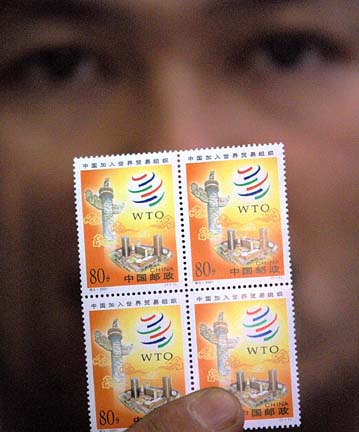


![]()
Talk Story
Has China’s second
economic revolution begun?WITH all the hullabaloo over cornering al-Qaida troops in Tora Bora and the three-month anniversary of the Sept. 11 attacks, most Americans probably didn't notice when China attained formal membership in the World Trade Organization Tuesday.
Even the Wall Street Journal buried its story, marking the event back on page A14. Yet experts say this event is a watershed -- China's second economic revolution.

|
The first took place in 1978 when Deng Xiaoping came to power and dumped Marxist economics in favor of a market economy.As Deng told Time Magazine in 1985, "If you want to bring the initiative of the peasants into play, you should give them the power to make money."
Make money they have, and as Joe Louis said, "I don't like money, but it quiets my nerves." In a country governed by a self-perpetuating, elite central government, keeping the masses from becoming overly nervous is a high priority.
In the 20-odd years since Deng became China's paramount leader, Chinese personal incomes have increased four-fold and the Chinese economy has grown to five times its former size. A major player in the global economy, the country now ranks sixth in the world in exports.
While the growth of China's private enterprise has been accelerating, its economy remains a hybrid. The steel, oil and transportation industries and all financial institutions are still state-owned enterprises.
Most of these state-owned businesses are in trouble. For example, Chinese banks are largely insolvent, says Christopher McNally, research fellow here at the East-West Center.
These businesses are in dire need of reform and McNally predicts that China will use the WTO to clean things up, just as the European Economic Union's member nations have used EEU regulations to fix things at home.
As the Journal put it, China's reformers "welcome the WTO's role in providing political cover for reforms they say were needed anyway."
In the past, state-owned enterprises have enjoyed favored status in China with better access to credit and markets. WTO membership should level the playing field and result in private businesses growing even faster.
By agreeing to WTO commitments, China will force its companies to respond to competition, rather than government whims as they have in the past.
In the next few years, China's markets will open gradually to foreign banks, law firms and insurance companies. Textile quotas and auto tariffs are scheduled to fall in 2005 and 2006 and telecommunications joint ventures will be liberalized in 2007.
The hybrid economy isn't likely to roll over without a fight, however. Many of China's richest have used it to line their pockets and they have a stake in preserving the system for as long as possible, McNally says.
These include:
>> Economic bureaucrats who have used insider knowledge and control of the system to go into business for themselves.Besides opening up China's markets to outsiders, what else will Chinese WTO membership mean? McNally sees three implications.>> Overseers of state-owned businesses, many of whom have spun off private subsidiaries for their own benefit.
>> Private entrepreneurs who run these subsidiaries in collusion with the overseers.
>> The overseas partners of all the above.
First, China will now have to abide by global rules and norms, including the international legal system. Thousands of lawyers are now being trained whose purpose will be to gain China's acceptance as a place to invest and do business.
Many laws are yet to be written, such as one to regulate joint venture fund-management companies. According to the Journal, this shortcoming has already delayed the launch of 18 new ventures.
Second, there will be political reforms, although McNally expects them to be timid -- on the order of tinkering with parliamentary procedures, consolidating the legal system and refining the role of the Communist Party. Nothing major, such as freedom of the press or democratic politics, is in the cards for now.
Third, the Chinese Communist Party will lean more to the right, toward capitalism -- but not toward democracy.
President Jiang Zemin sees allowing capitalists to join the party as a way to strengthen it, McNally says, while businessmen see party membership as a way to get access to power.
"The question," he says, "is who is capturing whom?"
The same can be said for the WTO. Does China's entry bring it into the global system, or does it bring the world into China's?
John Flanagan is the Star-Bulletin's contributing editor.
He can be reached at: jflanagan@starbulletin.com.